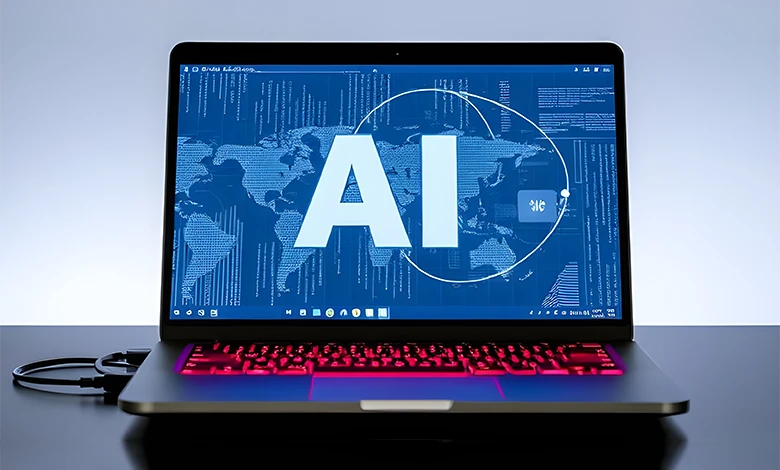AI Laptops: Do You Really Need an AI-Powered Computer?

Artificial Intelligence (AI) is rapidly transforming the tech landscape, and the world of laptops is no exception. AI-powered laptops are making waves in the market, with manufacturers promising enhanced performance, smarter features, and more efficient processes. But are these claims truly groundbreaking, or is the AI hype just another marketing trend? In this article, we’ll explore what AI laptops offer, how they work, and whether you need one for your daily computing needs.
What Are AI Laptops?
AI laptops are personal computers that incorporate machine learning, neural networks, and other forms of artificial intelligence to improve user experience and optimize system performance. These devices use AI to anticipate user needs, automate tasks, and adapt to your usage patterns. The ultimate goal is to make laptops smarter, faster, and more responsive, allowing for a more personalized and efficient experience.
How AI Laptops Work
AI laptops integrate advanced processors and specialized hardware designed to handle AI tasks. They leverage machine learning models to perform tasks such as:
- Performance Optimization: AI can monitor the laptop’s usage patterns and dynamically adjust system performance. This means it can manage CPU and GPU resources more effectively, ensuring you get maximum performance when running intensive tasks and conserving energy when you’re doing lighter work.
- Battery Management: With AI’s assistance, laptops can optimize battery life by learning your usage habits. If you often use your laptop for specific tasks at certain times of day, the AI can adjust power settings to extend battery life during critical moments.
- Voice Assistants and Virtual Interactions: Many AI-powered laptops come with advanced voice assistants that use natural language processing (NLP) to understand and respond to user commands. They can even predict your next steps based on past behavior, offering suggestions and reminders tailored to your preferences.
- Enhanced Security: AI laptops can utilize facial recognition, fingerprint scanning, and behavioral biometrics to enhance security. These methods offer faster and more secure authentication processes than traditional passwords.
- Adaptive Display and Sound: AI can adjust screen brightness and sound output based on environmental conditions or user preferences. For example, if you’re in a dimly lit room, the AI may automatically reduce the brightness to prevent eye strain.
- Data Management and Personalization: AI can help organize your files, suggest applications based on your usage patterns, and even assist with content creation, such as editing photos or videos, by offering smart editing tools powered by machine learning.
The Benefits of AI Laptops
- Increased Productivity: AI’s ability to automate tasks and optimize performance can lead to significant productivity gains. For example, AI can prioritize resource allocation, ensuring that your laptop runs efficiently even when multitasking.
- Personalized Experience: With AI, your laptop learns from your actions and preferences, delivering a more tailored and responsive user experience. Over time, it adapts to your needs, offering proactive suggestions that make work and leisure more seamless.
- Improved Security: AI-powered security features, such as facial recognition and behavioral biometrics, offer more secure and convenient ways to log in to your device. Additionally, AI can detect unusual activity patterns, helping to safeguard your data from potential cyber threats.
- Better Energy Efficiency: AI’s power management can make a big difference in battery longevity. By learning your usage habits, an AI laptop can optimize power consumption, making it easier to work on-the-go without constantly worrying about charging.
Do You Need an AI-Powered Laptop?
Whether you need an AI-powered laptop depends on your specific needs and how you use your device.
- Casual Users: If you primarily use your laptop for browsing, social media, and basic tasks, you may not need an AI-powered laptop. Standard laptops will meet your needs just fine, and the additional features provided by AI may not offer enough value for the extra cost.
- Power Users: For professionals working with resource-heavy applications—such as video editors, software developers, and data scientists—AI laptops may provide valuable performance benefits. AI can help optimize resources and automate repetitive tasks, potentially saving significant time and effort.
- Gamers: For gamers, AI laptops may enhance gaming performance by adjusting graphical settings, optimizing power, and reducing latency. AI-driven cooling systems and dynamic frame-rate adjustments can provide a smoother gaming experience.
- Students and Educators: Students and educators who rely on laptops for learning, research, and content creation may appreciate the AI-powered productivity features. AI can assist with organizing notes, managing schedules, and even suggesting study materials.
- Tech Enthusiasts: If you love staying on the cutting edge of technology and enjoy exploring the latest innovations, an AI laptop could be a fun and futuristic addition to your setup.
The Downsides of AI Laptops
While AI laptops come with many advantages, they also have some potential drawbacks:
- Higher Cost: AI technology can add to the price of a laptop. If you’re on a tight budget, you may find that a standard laptop can fulfill your needs without the additional cost of AI features.
- Privacy Concerns: AI-powered laptops rely on data collection and analysis to optimize user experience. This may raise concerns about how your data is used, stored, and protected, particularly if you’re sensitive about privacy.
- Learning Curve: Some users may find it difficult to adjust to AI features, especially if the laptop constantly adapts to their behavior. For those who aren’t very tech-savvy, the learning curve can be quite challenging.
- Potential for Over-Reliance on AI: While AI can automate many tasks, there’s always the risk of becoming too dependent on it. Relying too much on AI could mean losing the ability to perform tasks manually, which might be an issue in certain situations.
Conclusion
AI-powered laptops are undoubtedly impressive, offering a host of features that aim to improve performance, efficiency, and security. However, whether you truly need one depends on your usage habits and priorities. Casual users may find traditional laptops sufficient, while professionals and tech enthusiasts may benefit greatly from AI-enhanced performance.
Ultimately, the decision comes down to how much you value the convenience and additional capabilities that AI can bring. If you’re ready to embrace the future of computing, an AI laptop might be the perfect tool to boost your productivity and enrich your digital life. But if you’re satisfied with a more straightforward device, you may be able to skip the AI-powered model without missing much.
FAQs About AI-Powered Laptops
2. Do AI laptops improve gaming performance?
Yes, AI-driven features can enhance gaming by adjusting frame rates, optimizing GPU performance, and reducing latency. Some gaming laptops use AI-powered cooling systems to prevent overheating and maintain stable performance during long gaming sessions.
3. Are AI laptops worth the higher price?
It depends on your needs. If you require better performance, advanced security, and AI-driven automation, an AI laptop is a great investment. However, if you only use your laptop for basic tasks like web browsing and word processing, a standard laptop may be a more cost-effective choice.
4. Can I upgrade my current laptop to be AI-powered?
While you can’t add dedicated AI hardware to an existing laptop, you can use AI-powered software and applications to enhance its capabilities. However, these won’t match the performance of a laptop with built-in AI hardware.
5. Can AI laptops help with battery life?
Absolutely! AI algorithms learn your usage habits and adjust power settings dynamically, extending battery life by prioritizing efficiency when needed. This is especially useful for students and professionals who need longer-lasting devices.
6. What are the privacy concerns with AI laptops?
AI laptops rely on data collection and behavioral analysis to optimize user experience, which may raise privacy concerns. Users should review the device’s privacy settings and opt out of unnecessary data tracking if they are concerned about data security.
7. What are some examples of AI features in laptops?
- Real-time language translation.
- AI-enhanced photo and video editing.
- Voice assistants with improved accuracy.
- Adaptive performance tuning based on usage patterns.
8. What should I look for when buying an AI laptop?
- AI-specific hardware: Look for laptops with NPUs or AI-optimized processors.
- Software integration: Ensure the laptop supports AI-driven applications you plan to use.
- Battery life: Check how AI optimizations impact battery performance.
- Price vs. value: Evaluate whether the AI features justify the cost for your needs.
9. What are some of the best AI-powered laptops in 2025?
Some top AI-powered laptops in 2025 include models from Apple (MacBook Pro with M-series AI chips), Dell XPS AI Editions, ASUS ROG AI Gaming Laptops, and Lenovo ThinkPad AI Series. Always check the latest reviews to find the best option for your needs.
10. What is the cost of an AI laptop?
The cost of an AI laptop varies depending on the brand, specifications, and features. Entry-level AI laptops may start around $1,000, while high-end models with advanced AI capabilities can cost $3,000 or more. Prices are likely to decrease as the technology matures.




